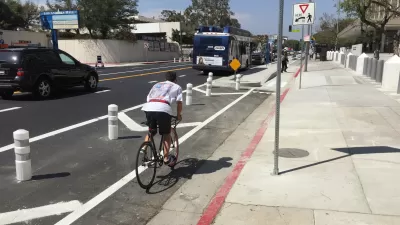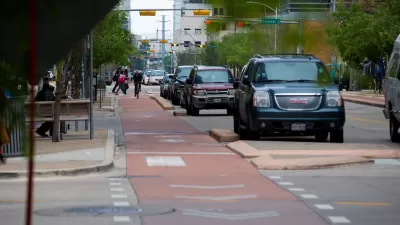A new ordinance would use automated enforcement to ticket drivers who block bike lanes, but some bike advocates say the city is avoiding the harder work of improving its bike infrastructure.

An ordinance aimed at improving road safety for Chicago bike riders is drawing mixed reviews from bike advocates, some of whom say it doesn’t go far enough to address safety concerns. Mina Bloom outlines the debate for Block Club Chicago.
“Under the measure, the city would install cameras on city vehicles and street poles in two pilot areas Downtown to identify parking violators and mail them a ticket.” The city says in addition to protecting people on bikes, this could also reduce congestion and speed up bus service. Christina Whitehouse, the founder of Bike Lane Uprising, calls the measure “light on details,” noting that there was little engagement with the public and bike advocates before its announcement. Whitehouse adds that the ordinance “doesn’t address pressing concerns for cyclists, such as dangerous construction zones and poor maintenance of city streets.” For Whitehouse, “it doesn’t feel like it’s genuinely about safety. It feels like it’s about trying to get votes for [Mayor Lightfoot’s] reelection.”
Other advocates also point out that the ordinance doesn’t take steps to address the city’s “shoddy bike lanes” or account for equity concerns. According to the city, low-income drivers could get reduced fines under the city’s Clear Path Relief Pilot Program.
FULL STORY: City Plan To Ticket Drivers Who Block Bike Lanes Downtown Draws Mixed Reaction From Cycling Advocates

Manufactured Crisis: Losing the Nation’s Largest Source of Unsubsidized Affordable Housing
Manufactured housing communities have long been an affordable housing option for millions of people living in the U.S., but that affordability is disappearing rapidly. How did we get here?

Americans May Be Stuck — But Why?
Americans are moving a lot less than they once did, and that is a problem. While Yoni Applebaum, in his highly-publicized article Stuck, gets the reasons badly wrong, it's still important to ask: why are we moving so much less than before?

Using Old Oil and Gas Wells for Green Energy Storage
Penn State researchers have found that repurposing abandoned oil and gas wells for geothermal-assisted compressed-air energy storage can boost efficiency, reduce environmental risks, and support clean energy and job transitions.

Updating LA’s Tree Rules Could Bring More Shade to Underserved Neighborhoods
A new USC study finds that relaxing Los Angeles’ outdated tree planting guidelines could significantly expand urban tree canopy and reduce shade disparities in lower-income neighborhoods, though infrastructure investments are also needed.

California's Canal Solar Projects Aim to Conserve Resources and Expand Clean Energy
California’s Project Nexus has begun generating electricity from solar panels installed over irrigation canals, with researchers and state agencies exploring statewide expansion to conserve water and boost clean energy production.

HHS Staff Cuts Gut Energy Assistance Program
The full staff of a federal program that distributes heating and cooling assistance for low-income families was laid off, jeopardizing the program’s operations.
Urban Design for Planners 1: Software Tools
This six-course series explores essential urban design concepts using open source software and equips planners with the tools they need to participate fully in the urban design process.
Planning for Universal Design
Learn the tools for implementing Universal Design in planning regulations.
Heyer Gruel & Associates PA
City of Moreno Valley
Institute for Housing and Urban Development Studies (IHS)
City of Grandview
Harvard GSD Executive Education
Salt Lake City
NYU Wagner Graduate School of Public Service
City of Cambridge, Maryland





























